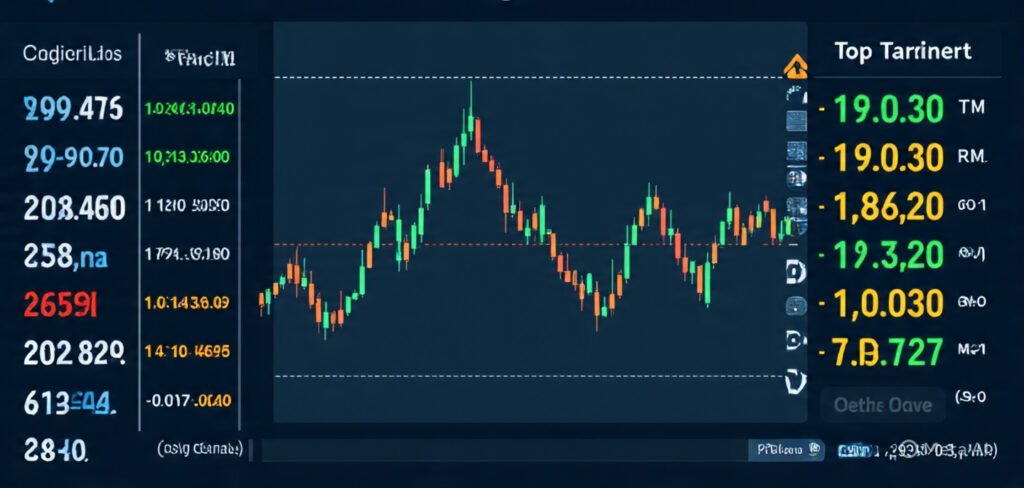Finding the best crypto trading platform has become increasingly challenging as the cryptocurrency market continues to evolve rapidly. With hundreds of exchanges competing for your attention, selecting the right platform can make the difference between profitable trades and costly mistakes.
Whether you’re a beginner taking your first steps into digital assets or an experienced trader seeking advanced features, choosing the best crypto trading platform requires careful consideration of multiple factors including security, fees, available cryptocurrencies, and user experience. This comprehensive guide will help you navigate through the top cryptocurrency exchanges of 2025, providing detailed insights to help you make an informed decision that aligns with your trading goals and risk tolerance.
What Makes the Best Crypto Trading Platform?
When evaluating cryptocurrency exchanges, several critical factors distinguish the best crypto trading platform from mediocre alternatives. Understanding these key characteristics will help you identify platforms that offer superior trading experiences while maintaining the highest security standards.
Security and Regulatory Compliance
Security remains the paramount concern when selecting any cryptocurrency exchange. The best crypto trading platform implements multiple layers of protection, including cold storage for customer funds, two-factor authentication, and regular security audits. Regulatory compliance also plays a crucial role, as licensed exchanges typically offer better consumer protection and operate under strict oversight.
Trading Fees and Cost Structure
Fee structures vary significantly across platforms, with some exchanges offering competitive maker-taker models while others charge flat rates. The most cost-effective platform depends on your trading frequency and volume. High-frequency traders typically benefit from exchanges with volume-based discounts, while casual investors might prefer platforms with transparent, low flat fees.
Available Cryptocurrencies and Trading Pairs
The breadth of available cryptocurrencies and trading pairs directly impacts your investment opportunities. Leading platforms typically offer hundreds of cryptocurrencies, including major coins like Bitcoin and Ethereum, as well as emerging altcoins and DeFi tokens.
Top 10 Best Crypto Trading Platforms in 2025

1. Binance – The Global Leader
Binance consistently ranks as one of the world’s largest cryptocurrency exchanges by trading volume. The platform offers an extensive selection of over 600 cryptocurrencies and provides both basic and advanced trading interfaces to accommodate users of all experience levels.
Key Features:
- Extremely low trading fees (0.1% spot trading)
- Comprehensive cryptocurrency selection
- Advanced trading tools and derivatives
- Mobile app with full functionality
- Binance Academy for educational resources
Pros:
- Highest liquidity in the market
- Competitive fee structure
- Regular new coin listings
- Strong security track record
Cons:
- Complex interface for beginners
- Limited customer support response times
- Regulatory challenges in some regions
2. Coinbase – Best for Beginners
Coinbase has established itself as the go-to platform for cryptocurrency newcomers, offering an intuitive interface and educational resources. The exchange operates under strict regulatory compliance in the United States and provides insurance coverage for digital assets stored on the platform.
Key Features:
- User-friendly interface design
- Educational earn programs
- FDIC insurance for USD deposits
- Coinbase Pro for advanced traders
- Direct bank account integration
Pros:
- Excellent for beginners
- Strong regulatory compliance
- Insurance protection
- Educational resources
Cons:
- Higher fees compared to competitors
- Limited cryptocurrency selection
- Geographic restrictions
3. Kraken – Security-Focused Trading
Kraken has built a reputation as one of the most secure cryptocurrency exchanges, never experiencing a major security breach since its inception. The platform offers both spot and derivatives trading with competitive fees and excellent customer support.
Key Features:
- Bank-level security measures
- Comprehensive trading options
- 24/7 customer support
- Advanced order types
- Staking services
Pros:
- Exceptional security record
- Professional-grade trading tools
- Responsive customer service
- Transparent fee structure
Cons:
- Limited mobile app functionality
- Complex interface for beginners
- Restricted availability in some regions
4. FTX – Advanced Trading Features
Despite recent challenges, FTX remains notable for its innovative approach to cryptocurrency trading. The platform pioneered many advanced trading features that are now industry standards.
Key Features:
- Innovative derivatives products
- Sub-account functionality
- Advanced portfolio management
- Leveraged tokens
- Professional trading interface
Note: Always verify the current operational status of any exchange before trading.
5. Huobi – Global Cryptocurrency Exchange
Huobi operates as one of the largest cryptocurrency exchanges globally, offering comprehensive trading services across multiple regions. The platform provides both spot and derivatives trading with competitive fees and extensive cryptocurrency selection.
Key Features:
- Global market presence
- Diverse trading options
- Competitive fee structure
- Mobile trading application
- OTC trading services
6. KuCoin – The People’s Exchange
KuCoin positions itself as “The People’s Exchange,” offering a wide variety of cryptocurrencies including many smaller altcoins. The platform features a profit-sharing mechanism through its native KCS token.
Key Features:
- Extensive altcoin selection
- Profit-sharing through KCS token
- Futures and margin trading
- Pool-X staking platform
- Trading bot services
7. Gemini – Regulated US Exchange
Founded by the Winklevoss twins, Gemini operates as a fully regulated cryptocurrency exchange in the United States. The platform emphasizes security and compliance while offering a clean, professional trading interface.
Key Features:
- Full regulatory compliance
- Insurance coverage for stored funds
- ActiveTrader advanced interface
- Gemini Dollar (GUSD) stablecoin
- Institutional trading services
8. Bitstamp – European Pioneer
Bitstamp stands as one of the oldest cryptocurrency exchanges, operating since 2011. The European-based platform has maintained a strong reputation for reliability and security throughout the industry’s evolution.
Key Features:
- Long operational history
- European regulatory compliance
- Professional trading interface
- Institutional services
- Multiple payment methods
9. Gate.io – Comprehensive Trading Platform
Gate.io offers an extensive range of trading services including spot, futures, and options trading. The platform supports hundreds of cryptocurrencies and provides various earning opportunities through its ecosystem.
Key Features:
- Comprehensive trading options
- Extensive cryptocurrency selection
- Startup launchpad for new projects
- Copy trading functionality
- Margin trading capabilities
10. Crypto.com – All-in-One Platform
Crypto.com has evolved into a comprehensive cryptocurrency ecosystem offering trading, earning, spending, and payment solutions. The platform’s Visa debit card allows users to spend cryptocurrencies in everyday transactions.
Key Features:
- Integrated ecosystem approach
- Crypto.com Visa card
- Earn program for passive income
- Exchange and app combination
- Strong marketing presence
How to Choose the Best Crypto Trading Platform for Your Needs
Selecting the optimal cryptocurrency exchange requires careful evaluation of your specific requirements and preferences. Consider the following factors to make an informed decision:
Assess Your Trading Experience Level
Beginners should prioritize user-friendly interfaces and educational resources, while experienced traders might prefer platforms with advanced charting tools and order types. The best crypto trading platform for you depends largely on your current skill level and willingness to learn complex features.
Determine Your Trading Style
Day traders require different features than long-term investors. High-frequency traders benefit from low fees and advanced tools, while buy-and-hold investors might prioritize security and ease of use over sophisticated trading features.
Geographic Considerations
Regulatory environments vary significantly across different countries and regions. Ensure your chosen platform operates legally in your jurisdiction and complies with local regulations to avoid potential issues.
Budget and Fee Sensitivity
Calculate the total cost of trading, including withdrawal fees, deposit fees, and trading commissions. Some platforms offer competitive trading fees but charge higher withdrawal costs, affecting your overall profitability.
Security Features to Look for in Trading Platforms
Security should be your top priority when selecting any cryptocurrency exchange. Look for these essential security features:
Cold Storage Implementation
The best crypto trading platform stores the majority of customer funds in offline cold storage, protecting them from online threats and hacking attempts.
Two-Factor Authentication (2FA)
Mandatory 2FA adds an extra layer of protection to your account, significantly reducing the risk of unauthorized access.
Insurance Coverage
Some exchanges provide insurance coverage for digital assets stored on their platforms, offering additional peace of mind for users.
Regular Security Audits
Reputable platforms undergo regular security assessments by third-party firms to identify and address potential vulnerabilities.
Understanding Trading Fees and Cost Structures
Trading fees can significantly impact your profitability, especially for active traders. Understanding different fee structures helps you choose the most cost-effective platform:
Maker-Taker Fee Models
Most exchanges use maker-taker pricing, where makers (liquidity providers) pay lower fees than takers (liquidity consumers). This model encourages market liquidity and often benefits experienced traders.
Volume-Based Discounts
Many platforms offer reduced fees for high-volume traders, with tier-based systems that provide better rates as your trading volume increases.
Hidden Costs
Consider all associated costs including deposit fees, withdrawal fees, inactivity fees, and spread costs on market orders.
Mobile Trading Applications and Accessibility
Modern cryptocurrency trading increasingly happens on mobile devices. The best crypto trading platform should offer:
Full-Featured Mobile Apps
Complete functionality including trading, portfolio management, and account settings accessible through mobile applications.
Real-Time Market Data
Up-to-date price information, charts, and market analysis available on mobile platforms.
Security Features
Mobile apps should maintain the same security standards as desktop platforms, including biometric authentication options.
Customer Support and User Experience
Quality customer support can be crucial during market volatility or technical issues. Evaluate platforms based on:
Support Channel Availability
Multiple contact methods including live chat, email, and phone support with reasonable response times.
Educational Resources
Comprehensive help centers, trading guides, and educational materials to help users navigate the platform effectively.
Community Engagement
Active social media presence and community forums where users can get help and share experiences.
Advanced Trading Features for Experienced Users

Professional traders often require sophisticated tools and features:
Derivatives Trading
Futures, options, and perpetual swaps for advanced trading strategies and risk management.
Margin Trading
Leverage capabilities allowing traders to amplify their positions (with corresponding increased risk).
API Access
Programming interfaces for algorithmic trading and automated strategies.
Advanced Order Types
Stop-loss, take-profit, and conditional orders for precise trade execution.
Regulatory Compliance and Legal Considerations
The regulatory landscape for cryptocurrency continues evolving. Consider these factors:
Licensing and Registration
Choose platforms registered with appropriate financial authorities in their operating jurisdictions.
Compliance Standards
Look for exchanges that follow Know Your Customer (KYC) and Anti-Money Laundering (AML) procedures.
Tax Reporting Tools
Some platforms provide transaction history and tax reporting features to simplify compliance obligations.
Future Trends in Cryptocurrency Trading Platforms
The cryptocurrency exchange landscape continues evolving with new technologies and features:
Decentralized Exchange Integration
Some centralized exchanges are incorporating decentralized trading options, offering users more control over their funds.
Enhanced Security Measures
Biometric authentication, hardware security modules, and other advanced security technologies are becoming standard.
Institutional Services
Growing focus on institutional clients with specialized trading tools, custody solutions, and regulatory compliance features.
Conclusion
Selecting the best crypto trading platform requires careful consideration of multiple factors including security, fees, available features, and regulatory compliance. While platforms like Binance excel in variety and low fees, exchanges like Coinbase offer superior user experience for beginners. Kraken stands out for security-conscious traders, while specialized platforms cater to specific trading needs.
The cryptocurrency landscape continues evolving rapidly, making it essential to stay informed about platform updates and new features. Consider starting with a well-established, regulated exchange that matches your experience level and gradually exploring advanced features as your knowledge grows.
READ MORE:Best Crypto Trading Platforms 2025 &amp ReviewsRankings

















